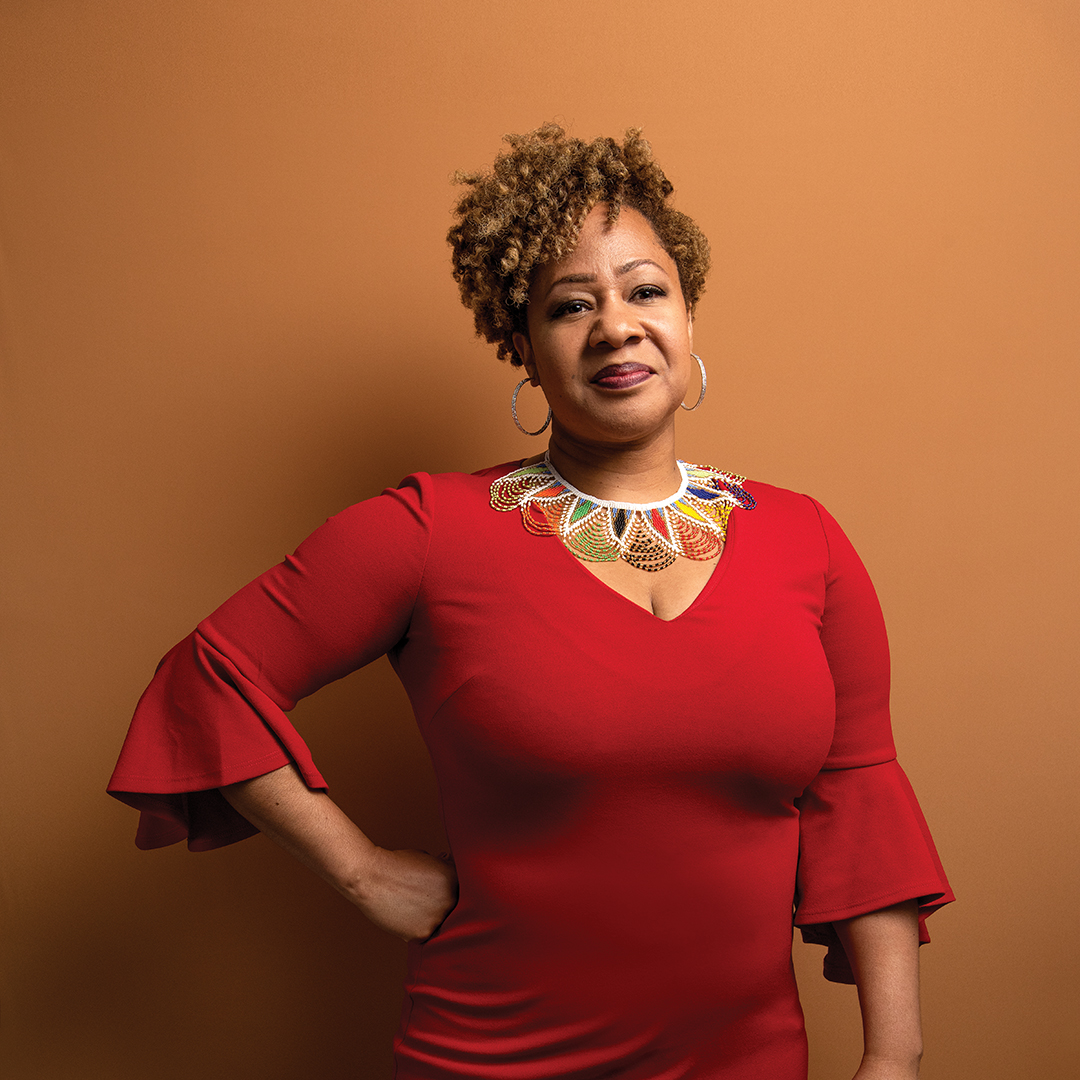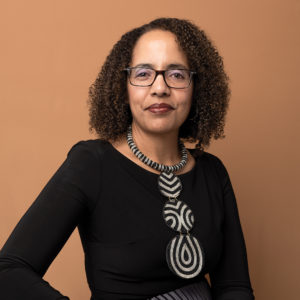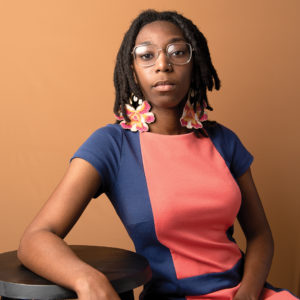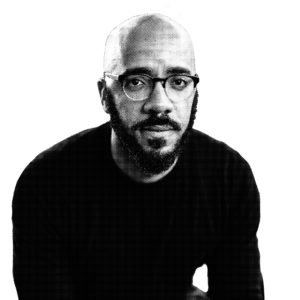Do we need African American studies?
As the nation debates, those in TCNJ’s department proclaim a resounding “Yes,” as they have for decades.

Zakiya Adair
When TCNJ students return to campus in August, there will be a new course offering: Introduction to African American Studies. After designing it with colleagues for more than a year, Professor Zakiya Adair, who is jointly appointed in the African American studies and women’s, gender, and sexuality studies departments, is pleased with how the course took shape. She’ll welcome about two dozen students to the class, which takes a broad, interdisciplinary approach and will examine everything from Black resistance and cultural expression to Black political thought and liberation. And for Adair, who is also the director of international studies, it was important the course didn’t just center on America. Black experiences from diasporas across the world have space on the syllabus. And, perhaps most importantly, it makes room for the study of Black joy and expression.
The course’s historic significance, on campus and beyond, isn’t lost on Adair. The Department of African American Studies recently celebrated its 50 years at TCNJ, but this is the first time the introductory course will be offered — a fact that highlights the school’s role as a leader in establishing Black studies but also underscores how adoption of the discipline has always been fraught with difficulty.
When Adair joined the department in the fall of 2015, she recognized the gap and set her sights on getting institutional support to create the class. “This intro course signals the actualization of our department,” she says.
Adair wrapped up final plans for TCNJ’s new course as African American studies took center stage in national headlines this winter. The College Board, the organization that runs the country’s slate of Advanced Placement courses, announced last year that African American studies would become the latest AP option for high school students. The College Board began to formally develop the AP course in the wake of George Floyd’s murder in 2020, though it had been in consideration for years prior to that. The organization enlisted Adair’s help, along with that of 100 other top scholars in the field.
Through a series of focus groups, these academics poured their expertise into online discussions. After months, they got to the heart of African American studies: an examination and commemoration of how all kinds of Black people have survived and remade their worlds despite continued oppression. They pushed to make sure the course was inclusive of various Black experiences by representing intersectionality, the idea that certain groups of people experience layered forms of discrimination due to the convergence of constructs like race and gender. It was imperative to Adair and her peers that the course appeal to younger generations by including the movement that they largely spearhead — Black Lives Matter.
“If we only talk about African American history, it conveniently roots oppression in the past and leaves the contemporary injustices up for thought or debate,” Adair says. “It wraps up African American struggles as something that happened in the past, but the past is present, and it’s also future.”
But just as soon as the AP course was praised for being piloted in 60 American classrooms this year, it got caught in the ongoing school culture war. African American history was lambasted for “lacking educational value,” as Florida Governor Ron DeSantis said when he announced that the state would not adopt the course.
“States were fighting critical race theory, so we always knew there would be parts of the country that would push back against the AP curriculum,” says Adair.
For her, the controversy brought urgency to the meaning of African American studies at TCNJ. “There are ways that African American history has become sanitized and palpable for the mainstream. But we have to tell the whole story of the Black experience,” she says.

After students and workers at San Francisco State University held a five-month strike in 1969 that birthed the country’s first ethnic studies department and Black studies degree, students at TCNJ picked up the baton. A series of protests at Green Hall led by Black and Latino students — against the backdrop of the Vietnam War, the growing Black power and Black arts movements, and the assassination of Martin Luther King Jr. — put pressure on the college. A list of demands from students called for the creation of a Black studies program and directly called out institutional racism as a reason for delay in the program’s establishment.
“It wasn’t like TCNJ actively sought to be one of the first schools with this program. It was a result of student activism,” says Piper Kendrix Williams, the African American studies department chair.
Initially, TCNJ hired a series of scholars who laid the groundwork for what the African American studies course work would look like. By 1972, a minor in Afro American studies boasted 14 classes, with eight of them being taught in the department and the others cross-listed with a variety of departments, including English and sociology. These faculty members — Gloria Harper Dickinson, Donald T. Evans, and Stephen Chukumba, among others — worked for decades to strengthen the discipline at TCNJ and move it out of obscurity. The college’s African American studies faculty members have typically been appointed to other areas of the college, and this split has meant slower development due to faculty commitment loads. And, because the department is interdisciplinary, the curriculum has been pieced together from various areas to provide students with broad training. Hence, two history courses — African American History to 1865 and African American History: 1865 to Present — have stood in as the introductory courses until Adair sought to change that. Over the decades, faculty shaped the classes that did exist with their expertise, such as Dickinson’s focus on Black women, Chukumba’s command of history, and Evans’ specialty in the arts.
The push for an official major started in the early 2000s, and faculty worked tirelessly until it was approved and offered in 2016. “The major represents the dream of all of those in our past who were dedicated to the significance of Black people’s experiences in the story of our world,” Williams says. Today, the African American studies department consists of six scholars and is the smallest department in the School of Humanities and Social Sciences at TCNJ. In the past five years, they’ve steadily increased the number of students who have declared it as their major.
Now, with an introductory course, the department will feel more complete. “Our students can get a full program of study, not one that starts with just history, but also examines what Black studies is,” Adair says. “It will help us answer students’ questions about the field early on and help them understand its activist beginnings.”

The department’s impact in its 50 years can best be observed in its students and alumni. Jada Grisson ’21 majored in African American studies and is now completing a master’s degree in English at TCNJ with a focus on African American literature. She’s had to overcome the stigma of her major — the idea that the course work is easier than other disciplines, or that it’s just an additive. “I spent a lot of time thinking that my intellectual interests weren’t meaningful, when in fact, they were,” she says. Because the major was rigorous and interdisciplinary, she’s breezing through graduate school. Next, she’ll turn to earning a PhD.
Jess Abolafia ’22, the prison and justice writing program assistant at PEN America in Manhattan, says her interest in working with writers behind bars and her commitment to abolition — rethinking and dismantling America’s carceral state — grew from classes she took at TCNJ, including The History of Race, Crime, and Prisons, and Criminology and the Legacy of Slavery.
Both Grisson and Abolafia, who weren’t initially aware of all that African American studies could offer, made it clear that they would have immediately enrolled as African American studies majors if there was the opportunity to take the AP course in high school, and especially if there was an introductory course at TCNJ to better bring them into the field.
African American studies’ rocky road at TCNJ mirrors the turbulent path that’s catapulted the AP course in the subject into America’s hyperpolarized discourse. As states such as Florida vow to block the course through legislation, other states, including New Jersey, are vehemently encouraging widespread adoption. TCNJ has already announced that it will accept college credit from the course. Whether students learn an accurate version of American history may come down to the state in which they live.
“It is atrocious that in 2023, there are parts of the country that will be able to completely censor meaningful material and opportunity for students,” Adair says.
Adair is ready for the introductory course and the AP course to lend greater legitimacy to the field at TCNJ and across the country at large. “Students and parents have to see that the discipline is viable,” she says. “If a school offers AP African American Studies, there’s going to be more students who major in it. And an intro course provides a complete field of study. That’s very important for Black studies at TCNJ and nationwide.”
Pictures: Peter Murphy
Going places
Author Clint Smith reckons with slavery’s complicated story, one landmark at a time.

“I wanted to write into the gaps that existed in my own education,” says Clint Smith, the New York Times best-selling author of How the Word Is Passed: A Reckoning with the History of Slavery Across America, who spoke in Mayo Concert Hall in March.
Dubbed “a person we need to hear from now,” Smith was the first guest invited to campus for the Kathryn A. Foster Distinguished Visitor series, in honor of the African American studies department’s 50th anniversary. He sat with Professor Michael Mitchell, and as he did in his book, spoke of how the story of slavery (especially in places with nuanced histories of it) is told in our country. One place Smith talks about is the Louisiana State Penitentiary, also known as Angola prison, where 75% of the incarcerated men are Black and must work in fields — the same fields slaves were once forced to work — sometimes picking cotton or other crops. Smith describes his experience at the prison museum, the start of a guided tour for visitors, in How the Word Is Passed, excerpted here.
The first thing I saw inside the museum was the wall behind the checkout counter. On the wall was a twenty-foot-wide image that kept my feet in place. Below the words LOUISIANA STATE PENITENTIARY was a photograph of two dozen Black men being marched into the fields, each of them carrying a long black hoe. They were wearing an assortment of grey sweatshirts and white T-shirts that rendered their bodies almost indistinguishable. To their far right was a white woman on horseback, her long blonde ponytail extending from beneath her black cap and down her back. The sun, full and luminous even in the black-and-white image, hung just above the trees in the distance, suggesting that these men were beginning their day. The procession of black skin carrying black hoes into this field further erased the identities of each man. They existed in this photo not as individual people but as a homogenous, interchangeable mass of bodies.
I turned away and then looked back multiple times to make sure I understood what I was seeing. The photo seemed to have been taken recently; it was not a vestige of the past. It was indeed a white person on horseback, herding a group of what seemed to be exclusively Black men into a field where they were forced to work. The unsettling nature and placement of the image was compounded by the fact that it welcomed its viewers into a gift shop stockpiled with an extensive inventory brandishing the Angola name.
Says Mitchell, “In the current sociopolitical climate, where clear examples of anti-Black racism are recurring in media, government, education, and criminal justice, having a distinguished Black writer and scholar on campus to speak about the legacy of American slavery was perfect for this moment.” — Kara Pothier
Posted on June 12, 2023

